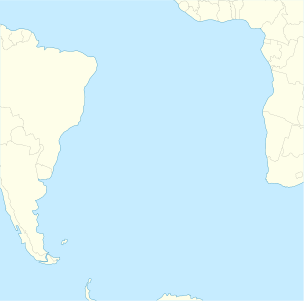SS Empire Chaucer
Empire Chaucer was a 5,970 GRT cargo ship which was built in 1942 by William Pickersgill & Sons Ltd, Sunderland. She was built for the Ministry of War Transport (MoWT). Completed in May 1942, she had a short career, being torpedoed and sunk by U-504 on 17 October 1942.

Description
The ship was built by William Pickersgill & Sons Ltd, Sunderland. She was launched on 18 March 1942 and completed in May 1942.[1]
The ship was 401 feet 0 inches (122.22 m) long, with a beam of 54 feet 0 inches (16.46 m) and a depth of 33 feet 2 inches (10.11 m). She had a GRT of 5,970 and a NRT of 3,501.[2]
The ship was propelled by a triple expansion steam engine, which had cylinders of 23 1⁄2 inches (60 cm), 38 inches (97 cm) and 66 inches (170 cm) diameter by 45 inches (110 cm) stroke.[2]
History
Empire Chaucer was built for the MoWT. She was placed under the management of W J Tatem Ltd,[2] Cardiff.[3] Her port of registry was Sunderland. The Code Letters BDVX and United Kingdom Official Number 169018 were allocated.[2]
In October 1942, Empire Chaucer departed Calcutta, India bound for the United Kingdom via Durban and Cape Town, South Africa and then via Trinidad. She was carrying a cargo of 2,000 tons of pig iron and 6,500 tons of general cargo, including mail and tea.[3]
Empire Chaucer departed Durban on 13 October bound for Cape Town. At 06:15 on 17 October, Empire Chaucer was torpedoed and sunk 450 nautical miles (830 km) south of Cape Town (38°12′S 20°04′E) by U-504 with the loss of three crew. The remaining 46 crew and a passenger took to the lifeboats. Twelve survivors, including the Captain, were rescued by Empire Squire and landed at Trinidad. Fifteen survivors spent 23 days in a lifeboat before being rescued by Nebraska. They were landed at Cape Town. The remaining 20 survivors landed at Bredasdorp on 31 October.[3] Those lost on Empire Chaucer are commemorated at the Tower Hill Memorial, London.[4]
References
- Mitchell, W H, and Sawyer, L A (1995). The Empire Ships. London, New York, Hamburg, Hong Kong: Lloyd's of London Press Ltd. ISBN 1-85044-275-4.
- "LLOYD'S REGISTER, STEAMERS & MOTORSHIPS" (PDF). Plimsoll Ship Data. Retrieved 24 March 2010.
- "Empire Chaucer". U-boat. Retrieved 24 March 2010.
- "Ship Index A-F". Brian Watson. Retrieved 20 May 2011.